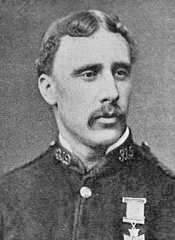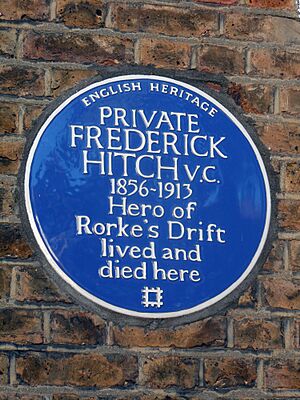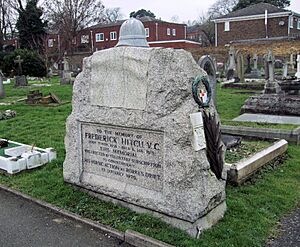Frederick Hitch facts for kids
Quick facts for kids
Frederick Hitch
|
|
|---|---|
 |
|
| Born | 27 November 1856 Southgate, Middlesex |
| Died | 6 January 1913 (aged 56) Chiswick, Middlesex |
| Buried |
St. Nicholas' Churchyard, Old Chiswick
(51°29′03.06″N 0°15′10.9″W / 51.4841833°N 0.253028°W) |
| Allegiance | |
| Service/ |
|
| Years of service | 7 March 1877 – August 1879 |
| Rank | Private |
| Unit | 24th Regiment of Foot |
| Battles/wars | Anglo-Zulu War - Rorke's Drift |
| Awards | Victoria Cross |
| Other work | London cab driver |
Frederick Hitch (29 November 1856 – 6 January 1913) was a brave English soldier. He received the Victoria Cross, which is the highest award for courage in the face of the enemy. He earned this medal for his amazing actions during the Battle of Rorke's Drift. This battle was a key part of the Anglo-Zulu War.
Contents
Frederick Hitch's Early Life and Military Service
Frederick Hitch was born in Southgate, Middlesex. He joined the British Army and became a private in the 2nd Battalion, 24th Regiment of Foot. This regiment later became known as The South Wales Borderers. Frederick could not read or write. When he joined the army, he signed his official papers with an 'X'.
Bravery at Rorke's Drift
During the Anglo-Zulu War, when he was 22 years old, Frederick Hitch fought in the Battle of Rorke's Drift. This famous battle took place on 22–23 January 1879. He was awarded the Victoria Cross for his incredible bravery.
The official report about his actions said:
War Office, May 2, 1879.
THE Queen has been graciously pleased to signify Her intention to confer the decoration of the Victoria Cross on the undermentioned Officers and Soldiers of Her Majesty's Army, whose claims have been submitted for Her Majesty's approval, for their gallant conduct in the defence of Rorke's Drift, on the occasion of the attack by the Zulus, as recorded against their names, viz.:—
2nd Battalion 24th Regiment Corporal William Allen and Private Frederick Hitch
It was chiefly due to the courageous conduct of these men that communication with the hospital was kept up at all. Holding together at all costs a most dangerous post, raked in reverse by the enemy's fire from the hill, they were both severely wounded, but their determined conduct enabled the patients to be withdrawn from the hospital, and when incapacitated by their wounds from fighting, they continued, as soon as their wounds had been dressed, to serve out ammunition to their comrades during the night.
Frederick Hitch was badly wounded during the battle. He was still recovering in the Royal Victoria Military Hospital in Netley, Southampton, when he received his medal. Queen Victoria herself presented him with the award. He was one of eleven soldiers who received the Victoria Cross for their bravery at Rorke's Drift.
Frederick Hitch's Life After the War

Frederick Hitch's injuries from the battle were very serious. Because of them, he had to leave the army. He found it hard to get steady work because his arm was damaged. He married in 1883. Living on his small disability pension from the government was difficult.
In 1901, while climbing a ladder, he fell. When he woke up in the hospital, his Victoria Cross, which he always wore, had been stolen. Another story says his medal was cut off his chest while he was working as a ceremonial guard. His regiment later replaced the medal. The original stolen medal was later found and bought back by his family. Both the original and the replacement medals are now kept in the regimental museum.
After this, Frederick Hitch lost his job. He was wrongly accused of faking his fall to hide that he had sold his medal. This was never proven. Frederick had eight children. He eventually found a good job driving a horse-drawn cab. Later, he switched to driving a motor taxi cab. This job gave him a comfortable income for many years.
Death and Memorial
Frederick Hitch passed away in 1913. He was living alone in Chiswick, West London, at 62 Cranbrook Road. A blue plaque from English Heritage marks his former home. He collapsed and died at home while talking to a neighbor.
He was buried with full military honors in St Nicholas' churchyard in Chiswick. Many London cab drivers attended his funeral. There is an award named after him, the Fred Hitch Gallantry Award, for cab drivers.
Frederick Hitch's Grave Site
His grave is in the middle of the churchyard of St Nicholas Church, Chiswick. It is easy to spot because it is more like a monument than a simple grave, with a helmet on top. The money for this memorial was collected through a fund set up after Hitch's death. Many people donated, including local leaders, mayors, members of parliament, and a wealthy banker named Leopold de Rothschild.
Extra money came from an American film producer, Joseph Menchen. He donated the money from the first showing of the world's first all-color feature film, The Miracle, at a new cinema in London.
Frederick Hitch's Victoria Cross Medal
Frederick Hitch's Victoria Cross medal is on display at the Regimental Museum of The Royal Welsh in Brecon, Powys, Wales.
Legacy and Film Portrayal
Frederick Hitch was played by actor David Kernan in the 1964 film Zulu. This movie tells the story of the Battle of Rorke's Drift.
 | Precious Adams |
 | Lauren Anderson |
 | Janet Collins |


